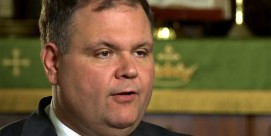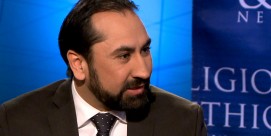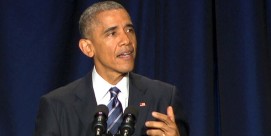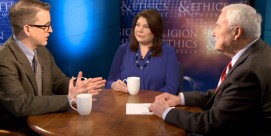Gary Dorrien: Party Unity and Convention Timidity
She was buoyant, strong, eloquent, and convincing. Also classy and passionate, in a speech that pulled off her threefold task. Hillary Clinton endorsed Obama immediately and unequivocally. She spoke straight to the feelings of the many that wanted her, not Obama. And she stated the negative emphatically, stressing that if you care about the issues that she campaigned about, you have to support Obama; switching to John McCain would be absurd.
By now she is a one-name political giant, inspiring a huge following that identifies with her and loves her. Hillary had expected to be president, but she expressed no bitterness. She put behind her the loss of a twenty-point lead, the slings and arrows of a tough campaign, and a good deal of sexist abuse in the media, projecting a sunny determination that looked beyond even the recent disappointment of being passed over for the vice-presidency. Brushing off all of that, she set a gold standard example of doing the right thing. Unlike Ted Kennedy in 1980, who turned the Democratic convention away from President Carter, or Ronald Reagan in 1976, who did the same thing to President Ford, Hillary helped unite the party behind the party rival who had defeated her.
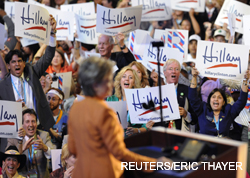 The speech was long on tropes that moved her supporters on the campaign trail—the personal narrative, the glass ceiling, the Harriett Tubman run—and it was carefully short in areas where an Obama supporter might have hoped for more. Hillary stood squarely with Obama, but did not specifically commend his abilities or his readiness for the job. She said “no way” about switching to McCain, but did not go after his record or policies. Somebody at this convention needs to lay out a case against Bush and McCain beyond a snappy one-liner.
The speech was long on tropes that moved her supporters on the campaign trail—the personal narrative, the glass ceiling, the Harriett Tubman run—and it was carefully short in areas where an Obama supporter might have hoped for more. Hillary stood squarely with Obama, but did not specifically commend his abilities or his readiness for the job. She said “no way” about switching to McCain, but did not go after his record or policies. Somebody at this convention needs to lay out a case against Bush and McCain beyond a snappy one-liner.
Conventions are about binding up and marching on, not the finer points of policy issues, or even the broad policies. Substantive proposals about issues and policies come later. How to restore fiscal sanity in Washington? How to pay for universal health care? How to manage the current economic meltdown? How to deal with Russia, China, Pakistan, Afghanistan, Iran, and North Korea, much less Iraq?
I accept that fiscal sanity and Russia must wait for the debates. At this convention I even accept, sort of, the decision to go light on racial justice issues, as Obama and the party are wary of scaring off undecided white voters. But wariness has extended, thus far, to almost anything that smacks of blasting the incumbent party.
The convention is more than half finished, yet very little has been said about George W. Bush, and virtually nothing has been said about Dick Cheney, a disastrous invasion of Iraq, the $12 billion per month bill for Iraq, war-gaming for Iran, torture, Guantanamo, the collapse of the housing market, and the trashing of civil and individual rights. A Democratic Convention in 2008 needs to hammer on some of this, especially if it has a cerebral, gentlemanly nominee who is averse to doing it himself.
Thus far this convention is too much like Obama’s post-primary campaigning, which has featured vague generalities and a tone of tepid niceness. For such a convention, Mark Warner was a perfect choice for keynote speaker. There is still time for the convention to sound more like Obama in the days just before the convention, when he seemed to discover his inner populist. If Hillary had found her populist voice three months sooner than she did, she probably would have won the nomination. Obama may need to be dissuaded from waiting until mid-October; in the meantime, Joe Biden needs to step up as the campaign’s happy warrior.
Hillary’s greatest gift to the Obama campaign, until Tuesday night, was to run as the self-satisfied front-runner for months. She topped that on Tuesday in the only sentence devoted to her husband, by linking Bill Clinton’s successful presidency to the necessity of an Obama presidency. That passing of the torch took a lot of class, and it will make a difference.
–-Gary Dorrien is the Reinhold Niebuhr Professor of Social Ethics at Union Theological Seminary and professor of religion at Columbia University.



